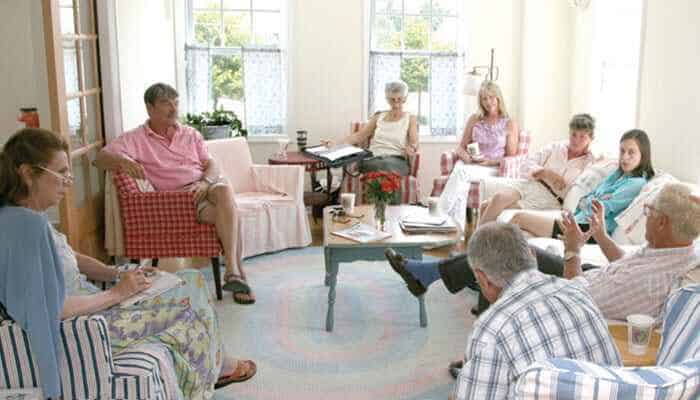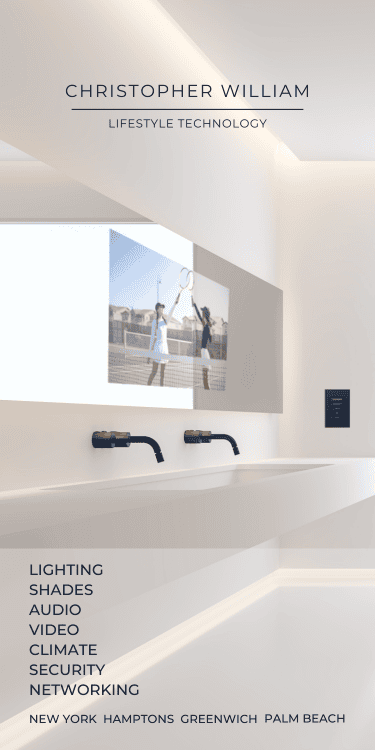Cancer. It’s the last word you want to hear. It marks the beginning of a most difficult journey for you and your loved ones, carrying with it psychological effects one cannot navigate alone. Duncan Darrow lost his mother to lung cancer and recalls how quickly life was turned upside down. Inspired to help others venturing down a similar path, he completed rigorous training courses to become a volunteer with East End Hospice. The services late-stage patients received were invaluable, and Darrow endeavored to support newly diagnosed patients in their journey as well. In 2002, Fighting Chance was founded and is now the nation’s oldest and largest free counseling center.
“Life is turned upside down and you go down this deep dark well,” Darrow recalls. “The way cancer treatment was organized on the East End in those days was for chemotherapy and radiation treatments, but no social workers or navigators. There was no one to help you figure it out and the internet was still in its infancy at that time. As a caregiver, it was frustrating.”
The nonprofit organization first produced a resource guide for coping with cancer on the East End that was distributed in libraries, churches, and available at their small Sag Harbor office. People were calling and asking about practical things, like where to buy a wig, and Darrow felt there was a need to further expand. There was a psychological distress produced from the disease that needed to be addressed.
Darrow brought on Karrie Robinson as an oncology social worker in 2004. With 15 years of experience at Memorial Sloane-Kettering Cancer Center in New York City, she had amassed a tremendous body of knowledge in trauma resulting from a cancer diagnosis. She was able to comfort and counsel patients, a service that proved to be invaluable to those Fighting Chance helps. Sharing that the differences between one-on-one counseling compared to other methods are profound, Darrow says Dr. William Di Scipio, a psychologist and counselor with Fighting Chance, did a study that found symptoms of a cancer diagnosis are similar to PTSD.
“You essentially have a near death experience triggered when you hear those terrifying words,” Darrow explains. “Hyper anxiety, hypertension, depression, fear of death, and nightmares; it’s that set of psychological disturbances. If you can get with someone one-on-one for a good period of time they begin to trust the counselor and begin to see there’s a way to talk through these fears that are gripping them.”

Patients that seek the guidance of Fighting Chance typically come in weekly for two to three months. The most common format is private patient and counselor sessions, though the organization offers sessions for the patient, their caregiver, and the counselor, as well as family counseling. In addition to a fear of death instilled in many at the time of a diagnosis is also the confusion that comes during the course of treatment. There is a stage where patients are looking for doctors and trying to learn how they can be helped, which brings them into another stage of being overwhelmed by complex information. With a navigator that serves as more of a case manager than just a health professional, Fighting Chance’s ultimate goal is empowering the patient to get to the point where they can regain composure and can feel like they’re digesting the data.
The local East End community has been active in supporting Darrow’s cause. Wölffer Estate Vineyards’ annual Lighting of the Vines takes place the Saturday after Thanksgiving and includes a charity holiday wreath auction benefitting Fighting Chance. Hampton Jitney CEO Geoff Lynch understands the need of reliable transportation for patients venturing in and out of Manhattan for medical treatment. Transportation can be expensive, and Fighting Chance raises money to allow patients to ride free. In a dollar-for-dollar matching program, Hampton Jitney pays for 50% of the ticket prices and helps cover the costs of approximately 1,000 tickets every year.
What comes next for Fighting Chance and the hundreds of people they help each year is the exciting unveiling of the new Phillips Family Cancer Center at Stony Brook Southampton, expected to celebrate with a ribbon cutting ceremony in February 2019. In addition to medical treatment, the center will serve as a second location for the organization to provide free counseling services.
“It’s pretty difficult these days on the East End for a doctor not to mention Fighting Chance,” Darrow shares. “At the core of what we do is the gold standard of counseling. It’s one-on-one between a patient and an oncology social worker. They help you navigate this journey. They’re in the boat with you.”
To become a member or donate:









!['The Maples' is a prestigious generational compound of two extraordinary estates: 18 Maple and 22 Maple. This rare offering, designed by luxury architect Lissoni partners New York and developed by visionaries Alessandro Zampedri-CFF Real Estate and JK Living, redefines opulence with the highest quality of craftsmanship and captivating views of the Atlantic Ocean. Represented by @nycsilversurfer and @challahbackgirl of @douglaselliman. [link in bio]](https://hamptonsrealestateshowcase.com/wp-content/uploads/sb-instagram-feed-images/438891010_1083749139481747_7890082604579275354_nfull.jpg)
![Featuring 360-degree water views on Mecox Bay, the Atlantic Ocean and Channel Pond, 1025 Flying Point offers the ultimate beach cottage that is flooded with natural light. With panoramic views, proximity to the ocean, and a private walkway to Mecox bay for kayaking or paddle boarding, this truly is a special retreat. Represented by @ritcheyhowe.realestate and @hollyhodderhamptons of @sothebysrealty. [link in bio]](https://hamptonsrealestateshowcase.com/wp-content/uploads/sb-instagram-feed-images/438994305_737511778456166_4602476013493875279_nfull.jpg)
![Attention advertisers! 📣 Secure your spot in the highly anticipated Memorial Day edition #HRES. Reach thousands of potential clients and showcase your brand in one of the most sought-after publications in the Hamptons, NYC, Palm Beach, and beyond. Contact us now to reserve your ad space! [link in bio]](https://hamptonsrealestateshowcase.com/wp-content/uploads/sb-instagram-feed-images/438549843_275102939023235_6718257301437562124_nfull.jpg)
![You eat with your eyes, and on the East End, it’s important that what you eat looks just as good as how it tastes. At @rosies.amagansett, the restaurant itself is plenty photo-worthy with blue ceramic tiling and yellow and white striped fabric wallpaper. But for a dish that will light up your photos, head directly to the salmon tartare! [link in bio]](https://hamptonsrealestateshowcase.com/wp-content/uploads/sb-instagram-feed-images/437094269_7296727147115953_1594410326824303644_nfull.jpg)

![We were honored to be the media sponsor for @blackmountaincapital's open house event with @jameskpeyton and @jfrangeskos at 11 Dering Lane in East Hampton! Other sponsors included @landrover, Feline Vodka, @rustikcakestudio, @la_parmigiana, @lahaciendamexicangrill11968, @homesteadwindows, Stone Castle, @talobuilders, and @thecorcorangroup.
A big thank you Carrie Brudner of Black Mountain Capital for putting together this fabulous event! [link in bio]](https://hamptonsrealestateshowcase.com/wp-content/uploads/sb-instagram-feed-images/437081213_762912965932136_6847332836522786568_nfull.jpg)

![Blooms Galore at the Long Island Tulip Festival! 🌷✨ Mark your calendars for April 15th as the vibrant tulips at @waterdrinkerlongisland burst into full bloom! Enjoy a day filled with colorful splendor, food trucks, live music, and more. [link in bio]](https://hamptonsrealestateshowcase.com/wp-content/uploads/sb-instagram-feed-images/437083429_974242677583725_6855805712693638343_nfull.jpg)
